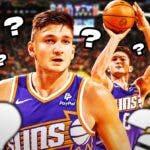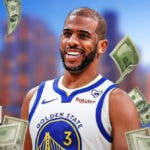With no deviation from what has now become expectation for the team, the Washington Wizards have had a wild season so far. Whether it has been the inability to keep Dwight Howard, who was supposed to be their big offseason addition, healthy and on the court, the season-ending injury John Wall faced less than halfway through the team’s 82 games, or the trademark chemistry issues plaguing the team right out of the gate, the Wizards have had no shortage of drama and turmoil.
The potential of trading shooting guard Bradley Beal has also become a rumor to keep an eye on, and one the Wizards would be smart to keep from doing before the trade deadline expires.
The season began with expectations from ownership to hit the 50-win mark this season and make waves in the playoffs, despite a six-game first-round exit the season prior. Currently struggling just to get back to .500, it isn’t looking too likely that they will hang 50 wins on the season. Their 20-27 record has them in 10th place in the Eastern Conference standings. However, only three games away from the eighth seed, the possibility of making the playoffs is still alive.

Washington has gone 6-4 through their last 10 games and has looked like a different team for stretches recently. The big difference between now and the start of the season is traced back to stellar play from Bradley Beal. His efforts to put the team on his back and recalibrate not just their play, but their identity as well has been one of the few sources of optimism for the franchise this season. Amid rumors and discussion that it could be time for the Wizards to begin weighing trade options for their players, there are three major reasons that Beal shouldn’t be one of those players.
3. Beal is showing franchise player potential
It has been no secret that Beal, who made his first All-Star Game last season, is an incredible talent. Somehow, though, the seventh-year guard has managed to take it to another level this season. With John Wall out, Bradley Beal has made this his team and the impact is evident.
Prior to the team’s loss of their supermax-contract point guard, Beal was putting up great numbers. In 35 total games alongside Wall, Beal was averaging 23.5 points, 4.8 rebounds, 4.7 assists, and 1.1 steals in 36.6 minutes of action. He was also draining 2.3 threes per game while shooting 33.9 percent. In the 14 games that Wall has been out, Beal averaged 27.4 points, 5.9 assists, 5.6 rebounds, and 2.3 steals, while dropping 3.1 treys per game at 38.8 percent — almost identical to his career average of 38.7 percent.
Among all players in the league in their last 14 games, Bradley Beal ranks in the top 10 in points, steals, and 3-pointers made.
Not only has he been putting up great numbers, but he has been contributing to the team playing winning basketball, and it shows in his advanced stats. Per Basketball Reference, in the games before Wall was injured, Beal had a 27.1 percent usage rate, 21.4 assist rate, 11 percent turnover rate and a 116 defensive rating per 100 possessions. However, with Wall out, he is playing with a 31.2 percent usage rate, 26.2 percent assist rate, 12.1 percent turnover rate, and 109 defensive rating per 100 possessions. These numbers indicate how this isn’t just an increase in opportunity for Beal, but he is also playing more efficient offensively and better overall on the defensive end.
Through the Wizards' first 35 games with John Wall healthy, the team went 13-18. Following his injury, their record is 8-6. Moving forward, there is a real possibility that Bradley Beal could be the best player and focal point of this team.

2. His contract will only get better
The summer of 2016 saw a number of tough-to-swallow contracts handed out among the league. In what has become an albatross for that free agent class. Bradley Beal may have been one of the best values of that offseason, despite signing a max deal.
Beal and the Wizards agreed on a five-year deal totaling roughly $130 million. In the final year of his deal in 2020-21, he is set to make just over $28.7 million. If a player like Jimmy Butler signs a max contract this summer, it will begin at about $27.25 million in the first year. In the fourth year of the contract, the cap hit will total just over $34.3 million — almost $6 million more than what Beal will make in his final year.
With the cap having only gone up since Washington locked up Beal, and projected to continue in this direction, this will only become more favorable to the Wizards over time. For teams that aspire to chase a title, those couple extra million dollars here and there are what could allow for meaningful signings of role players and the key pieces that help win championships.

1. The Wizards could move other players
If the Washington Wizards reach a point where they truly believe that their team as currently constructed can no longer compete at the level they hope, they have many options outside of trading Bradley Beal.
The possibility of moving John Wall would be something the team could consider moving forward, and an option that was lightly discussed earlier this season. With the team playing so well behind Beal, shedding Wall’s $38-million-plus per year may not be the worst idea. It would undoubtedly be a tough move to pull off, but if they are flexible on what they get in return, it wouldn’t be impossible.
Similarly, the Wizards could explore the idea of trading Otto Porter. Set to make money close to Beal’s contract, unloading him would free up a lot of space and give the team more opportunities to reconstruct the roster. While Porter has had success in Washington, the services he provides aren’t as irreplaceable as Beal’s.
The Wizards also own all their first-round picks moving forward, which would ease the process of finding suitors for the large contracts. Using those picks wouldn’t be ideal for just unloading all of that money, but could prove helpful in ensuring that Washington receives a quality return in those trades.




